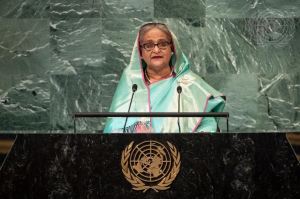While addressing the 77th United Nations General Assembly (UNGA) on September 23, 2022, Bangladesh Prime Minister Sheikh Hasina yet again called upon global leaders to take effective actions to ensure safe, voluntary, and sustainable Rohingya repatriation to Myanmar. Notably, more than 700,000 Rohingya Muslims escaped state-sponsored violence and persecution from Myanmar to Bangladesh in August 2017, creating a colossal catastrophe.
Hasina alleged that the protracted issue of Rohingya refugees sheltered in Bangladesh has serious ramifications for her country’s economy, security, and socio-political stability. She cautioned that if the crisis remains unresolved, it possibly will cause instability and insecurity in the “region and beyond.”
Obviously, the uncertainty over the Rohingya people’s repatriation to Myanmar has generated pressing concerns and frustrations for the Bangladesh government. Besides economic difficulties, there has been an alarming rise in cross-border organized crime as well as human and drug trafficking. Hasina also voiced concerns that challenging situation could possibly “fuel extremism” in Bangladesh.
Nonetheless, the present political chaos and armed clashes inside Myanmar make the repatriation of the displaced Rohingya refugees even more difficult. Another major hurdle to resolving the crisis are the unfavorable policy responses by China and Russia – two permanent members of the Security Council with veto powers.
Despite having cordial and warm relations with the above-mentioned two world powers, Bangladesh has failed to obtain their crucial support on the Rohingya issue. Mainly because of geopolitics, both the countries remain strong strategic partners of the Myanmar regime. Both are providing substantial arms and ammunitions to strategically significant Myanmar, while China’s investment in numerous development projects in the country hit $21 billion in March 2020. Both China and Russia opposed a U.N. resolution on the Rohingya issue in December 2017, and they have repeatedly maintained that the Rohingya refugee issue is a bilateral problem between Bangladesh and Myanmar and should not be debated at international fora.
Nonetheless, Hasina has urged the United Nations to play an effective and tougher role to resolve the crisis at every opportunity. Notably, in her previous speeches to the UNGA (2017, 2018, and 2019), Hasina also raised the protracted Rohingya issue and put forward proposals for their safe, voluntary and dignified early return.
Significantly, a day before her address to the UNGA this year, Hasina also floated a five-point proposal at an important side event on the prolonged crisis and pushed for more tangible actions by the international community. Her five points are:
- Fully support the Rohingya people politically as well as financially;
- Legally support trials at the International Court of Justice and International Criminal Court in order to implement international law and help fight against violations of human rights in Myanmar;
- Build robust pressure on Myanmar to halt continual subjugation of ethnic and religious minorities;
- Implement Myanmar’s commitments under ASEAN’s Five-Point Consensus; and
- Ensure unhindered humanitarian access.
Notwithstanding the repatriation agreement inked between Bangladesh and Myanmar on November 23, 2017, not a single Rohingya stranded in Bangladesh could be repatriated to their motherland in the Rakhine state of Myanmar. The security situation in Myanmar has worsened significantly since then, as a result of the military overthrow of the elected government of Aung San Suu Kyi in February 2021 and imposition of state of emergency. Notably, Aung San Suu Kyi’s government also ignored the recommendations of the 2017 Kofi Annan-led Special Advisory Commission’s report, which called for restoration of rights and citizenship of the Rohingya people.
Regrettably, apart from providing substantial humanitarian assistance, there has been limited response by the United Nations to deal with the Rohingya crisis, even though the U.N. and other major world actors have strongly condemned it as a “textbook example of ethnic cleansing.” U.N. Secretary-General Antonio Guterres visited Bangladesh on July 1-3, 2018 to see the plight of the Rohingya. Assuring Bangladesh, he said, “We’re keeping up pressure on Myanmar… we need to put more pressure on Myanmar to make them understand what they should do on this issue.”
Also, on September 18, 2018, the U.N. Fact-Finding Mission on Myanmar restated its demand for the investigation and prosecution of Myanmar’s Commander-in-Chief, Senior General Min Aung Hlaing, and other top military leaders for genocide and crimes against humanity. The United States , Australia, and the European Union have also imposed a series of sanctions on the Myanmar military leaders, including imposing arms embargoes since the coup. The targeted sanctions are positive steps to demoralize the merciless Myanmar military.
However, Bangladesh expected more concrete and intense diplomatic pressure from the global community to force Myanmar to take back their people. Notably, earlier diplomatic efforts and engagements with the top most civilian and military leaders of Myanmar as well as with the U.N. and other international bodies have failed to ensure a lasting solution to the crisis.
The Rohingya crisis poses an enormous challenge for Bangladesh and threatens its national security. Hasina’s speech in the UNGA emphasized the problem, and her five-point proposal for more effective and determined actions by the international community was her latest attempt to find a permanent resolution to the Rohingya crisis. Will the international community take more drastic measures?

































